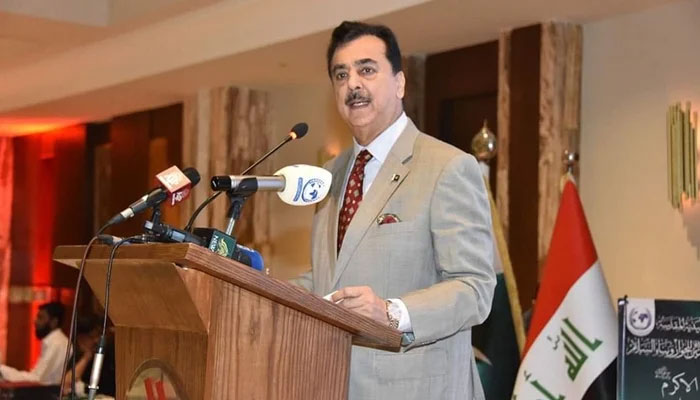Climate change threatens sustainable growth: Gilani
Gilani underscores the urgency of preparing Pakistan’s agriculture sector to withstand climate impacts
ISLAMABAD: Acting President and Senate Chairman Syed Yusuf Raza Gilani highlighted climate change as a pressing obstacle to Pakistan’s sustainable development on Monday, urging a shift toward a climate-resilient food system to mitigate growing food insecurity.
Addressing the nation’s vulnerabilities, Gilani underscored the urgency of preparing Pakistan’s agriculture sector to withstand climate impacts, which he described as one of the nation’s most significant challenges.
Gilani also pointed to recent economic measures, which he credited with helping Pakistan sidestep the threat of default. These tough decisions, he explained, were made to stabilize the economy amid a “polycrisis” of intersecting challenges. The government’s Vision 2025 strategy, aligned with the Sustainable Development Goals (SDGs), outlines long-term development objectives that support economic and resilience.
To guide future growth, Pakistan’s “5Es Framework” highlights priority areas including exports, e-governance, climate resilience, energy security, and equity. This framework, Gilani noted, offers a pathway toward sustainable progress and a foundation for tackling Pakistan’s overlapping economic and environmental issues.
At the 27th Sustainable Development Conference, Gilani spotlighted Pakistan’s advances in climate governance and sustainability. Organized by the Sustainable Development Policy Institute (SDPI) with the Ministry of Climate Change, the event themed “From Fragility to Resilience” focuses on resilience, mitigation, poverty alleviation, and energy efficiency goals.
Prime Minister’s Coordinator on Climate Change Romina Khurshid Alam underscored the severe impacts of climate change on South Asia, noting that more than 750 million people in the region have faced natural disasters in recent decades.
Highlighting Pakistan’s 2022 floods, which caused $30 billion in losses, Alam called for joint climate efforts with India to combat smog in Lahore and address shared environmental challenges.
Alam emphasized the growing need for global financing to address climate-related damages, warning that developing nations could face losses up to $1.8 trillion annually by 2050. She also highlighted Pakistan’s initiatives against plastic pollution under Prime Minister Shehbaz Sharif’s leadership and called for unified resilience-building efforts ahead of COP29 in Baku.
SDPI Executive Director Dr. Abid Qaiyum Suleri emphasized that Pakistan, like much of the world, stands at a crossroads, facing crucial choices amid climate and geopolitical challenges. He highlighted the resilience shown by Pakistanis after the 2022 floods and pointed to the country’s transition to solar energy and increased social activism.
SDPI Chairperson Ambassador Shafqat Kakakhel opened the conference with remarks on the urgency of reducing greenhouse gases and addressing Pakistan’s own poverty and pollution issues, noting that 40 per cent of Pakistan’s population lives below the poverty line. Pakistan has experienced economic improvement through increased agricultural and industrial production, he added.
-
 Dax Shepard Describes 'peaceful' Feeling During Near-fatal Crash
Dax Shepard Describes 'peaceful' Feeling During Near-fatal Crash -
 Steve Martin Says THIS Film Has His Most Funny Scene
Steve Martin Says THIS Film Has His Most Funny Scene -
 Kensington Palace Shares Update As Prince William Continues Saudi Arabia Visit
Kensington Palace Shares Update As Prince William Continues Saudi Arabia Visit -
 Fugitive Crypto Scammer Jailed For 20 Years In $73m Global Fraud
Fugitive Crypto Scammer Jailed For 20 Years In $73m Global Fraud -
 Will Andrew Mountbatten-Windsor Finally Go To Jail Now That King Charles Has Spoken Out? Expert Answers
Will Andrew Mountbatten-Windsor Finally Go To Jail Now That King Charles Has Spoken Out? Expert Answers -
 Melissa McCarthy Reveals Her Tried And Tested ‘corpse’ Night Time Routine That’s Lost Her 95lbs
Melissa McCarthy Reveals Her Tried And Tested ‘corpse’ Night Time Routine That’s Lost Her 95lbs -
 Horrifying Pictures Of The Kidnapper Of Savannah Guthrie's Mother Released
Horrifying Pictures Of The Kidnapper Of Savannah Guthrie's Mother Released -
 Andrew's Ex-girlfriend Launches Brazen Attack On Epstein Victims On Piers Morgan Show
Andrew's Ex-girlfriend Launches Brazen Attack On Epstein Victims On Piers Morgan Show -
 Andrew Mountbatten-Windsor 'on His Own' As Palace Gives Green Light To Law Enforcement
Andrew Mountbatten-Windsor 'on His Own' As Palace Gives Green Light To Law Enforcement -
 Kanye West's Tweet About Super Bowl Halftime Resurfaced After Bad Bunny's Show
Kanye West's Tweet About Super Bowl Halftime Resurfaced After Bad Bunny's Show -
 'FBI' Star Juliana Aidén Martinez Tease Her Return To 'Law And Order: SVU' After Quitting
'FBI' Star Juliana Aidén Martinez Tease Her Return To 'Law And Order: SVU' After Quitting -
 Cardi B's Emotional Words To Pal Amid Stefon Diggs Rumored Breakup Revealed
Cardi B's Emotional Words To Pal Amid Stefon Diggs Rumored Breakup Revealed -
 Princess Eugenie Breaks Cover Amid Explosive Family Scandal
Princess Eugenie Breaks Cover Amid Explosive Family Scandal -
 Will Kate And Anthony Have 'Bridgerton' Spin Off? Revealed
Will Kate And Anthony Have 'Bridgerton' Spin Off? Revealed -
 Schoolgirl Eaten Alive By Pigs After Brutal Assault By Farmworker
Schoolgirl Eaten Alive By Pigs After Brutal Assault By Farmworker -
 King Charles’ Statement About Epstein Carries A Secret Meaning: Here’s Why It Can Be An Invite To Police
King Charles’ Statement About Epstein Carries A Secret Meaning: Here’s Why It Can Be An Invite To Police




